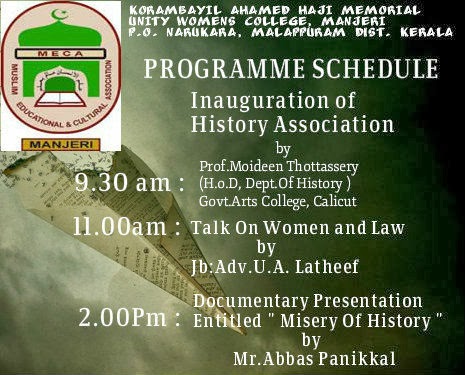‘Misery of History,’ a
30-minute documentary, revisits the legacy of the illustrious warrior and
traces his descendents.
Tipu
Sultan’s name is synonymous with valour and statecraft in the history of
pre-independent India. The ‘Tiger of Mysore’ was a formidable force against the
British till his death in 1799. His name is mired in controversies, the
veracity of which is being still debated.
‘Misery of History,’ a 30-minute documentary film directed by
Abbas Panakkal, a Kozhikode-based freelance writer and mediaperson, is an
attempt to revisit the legacy of the warrior while also looking into the
present status of his descendants.
Not many know that the descendants of Tipu, the last ruler
of India strong enough to dictate terms to the British East India
Company, is still alive in Kolkata. The ‘Misery of History’ is a journey
the director takes up with a few historians of repute such as B. Sheik
Ali and K.K.N. Kurup to the historical sites, museums, and monuments
related to the ruler as well as to the places where
his descendants live now.
The film opens in a street of Kolkata, where a thin, famished
middle-aged man struggles to ride a cycle-rickshaw with a couple of travellers.
His name is Sanvar Shah, a 7{+t}{+h}generation descendent of Tipu who lives in
penury with his family. He is well aware of what his illustrious ancestor once
possessed as he rides on the rickshaw, narrating his misery, through one of the
lanes named after Tipu.
The film then takes the viewers to historical sites including
the one where the famous Tipu Fort of Srirangapatanam once stood. It shows how
badly the important sites related to the Mysore Sultan are maintained, posing a
question whether he deserved only this considering the contributions he made in
the field of education, technology, diplomacy, and statecraft.
‘Not a fanatic’
It also wants viewers take a re-look at the largely “British
propaganda” that he was a religious fanatic. Citing historical evidence, the
documentary states that majority of Tipu’s key officers were non-Muslims and
even his chief spokesperson and treasurer were Hindus. The film urges the
viewers not to overlook the myriad instances of Tipu giving land and grants to
Hindu temples in south India besides helping renovate the Shringeri Mutt of
Sankaracharya when it was destroyed by the Marattas in a raid.
Dr. Kurup says it will be hard to see a ruler misunderstood as
grossly as Tipu Sultan in Indian history. It is largely in the interests of
British rulers that Tipu was portrayed as a religious bigot by some historians,
adds Dr. Sheik Ali.
The documentary, produced by the Malabar Institute for Research
and Development, is part of its initiative to promote secularism and
inter-faith harmony, said Mr. Panakkal. The team, comprising the historians and
cameramen Ajeeb Komachi and Akhil Komachi, had travelled to all relevant sites,
including Kolkata and the Victoria and Albert Museum in London, to shoot the
film.
‘Misery of History’ was screened at the Crown theatre in the
city on Sunday before an invited gathering.
‘Misery of
History,’ a 30-minute documentary, revisits the legacy of the illustrious
warrior and traces his descendents.



No comments:
Post a Comment